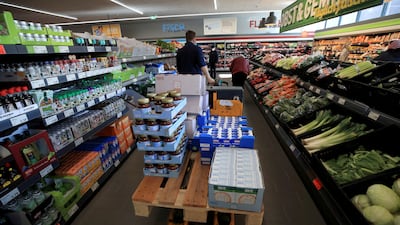Aldi supermarkets will close early this winter to assist Germany’s efforts to save energy.
Luxembourg meanwhile announced a four-tier ranking of who will get priority if energy has to be rationed.
British retailers said they were prepared to heed energy-saving advice if shortages occur.
The measures are Europe’s latest preparations for a difficult winter after Russian cuts tore a hole in its gas supplies.
Households have been told to cut back on energy use to save money and make Europe’s limited supplies last longer.
Germany on Thursday announced a second week of encouraging figures as warmer weather helped drive down gas use.
Household gas consumption in the second week of October was 31 per cent down compared with the average of the past four years.
Industrial use was also down and storage tanks were more than 96 per cent full as of Thursday.
“This is encouraging … we have to carry on like this,” said Germany’s power grid regulator as it released the figures.
The push to save gas comes as Germany rapidly builds new terminals on its northern coast so it can import directly from suppliers other than Russia.
“We have to slap ourselves on the wrist and say we failed in that regard in the past few decades,” a German government official said.
“While other European countries built up import infrastructure, we are now quickly playing catch-up.”
The news came as Aldi announced that its 2,220 shops in the north of Germany would make an “active contribution” by closing at 8pm instead of 9pm or 10pm.
The early closure will stay in place throughout the winter, in an echo of the coronavirus-related curfews of the past two years.
It goes beyond moves by retailers such as France’s Louis Vuitton group and Austrian supermarket Spar to dim the lights while their shops are still open.
In the UK, ministers have refrained from issuing formal energy-saving advice as their EU colleagues have done.
But a spokeswoman for the British Retail Consortium told The National: “Retailers already have a strong focus on energy efficiency and will pay attention to all advice on energy supply if and when it emerges.”
Supermarket chain Morrisons said it continually looked ahead to external factors that could affect its business.
In Luxembourg, consumers have been sorted into four categories ranked by how urgently they need gas.
In an emergency situation, companies could be forced to switch fuels or take a “haircut” in their gas supply.
Schools, hospitals and domestic households would be the last to have their power cut in an emergency.

In Switzerland, ministers on Thursday announced an “energy saving alliance” with more than 180 companies and local authorities to encourage lower use.
The country is aiming to emulate the 15 per cent gas savings being targeted in the EU, under the motto: “Energy is scarce. Let’s not waste it.”
The situation was even more precarious in Ukraine, where Russian air strikes have knocked out about 30 per cent of the country's energy infrastructure.
President Volodymyr Zelenskyy on Thursday told people to cut back electricity use and brace for potential four-hour blackouts.
The EU’s 27 leaders were assembling in Brussels on Thursday to discuss a joint response to the crisis.
A particularly contentious question is whether to cap wholesale gas prices, as France and more than a dozen other EU members are demanding.
Germany and others are concerned that tankers carrying liquid gas would not deliver to Europe if the offered price is too low.
Luca Visentini, the general secretary of the European Trade Union Confederation, said millions were struggling to afford food and energy.
“Some progress has been made but action needs to match the urgency of the situation if we are to avoid this crisis costing lives this winter,” he said after meeting EU leaders.


